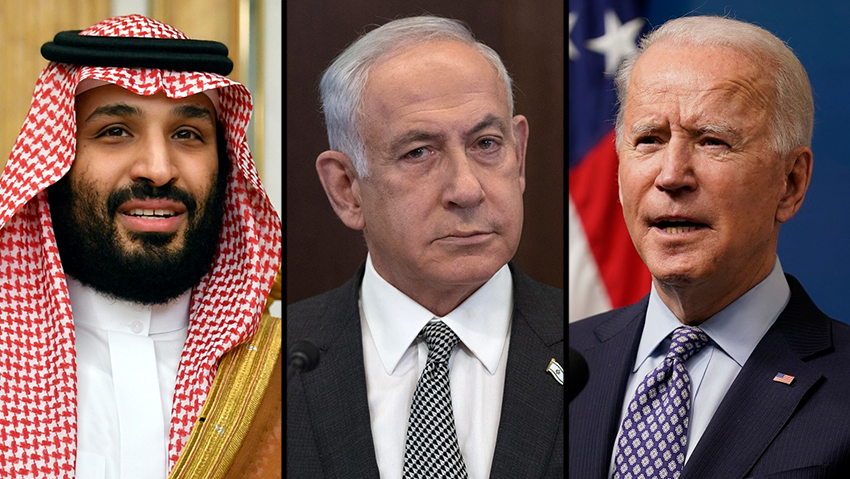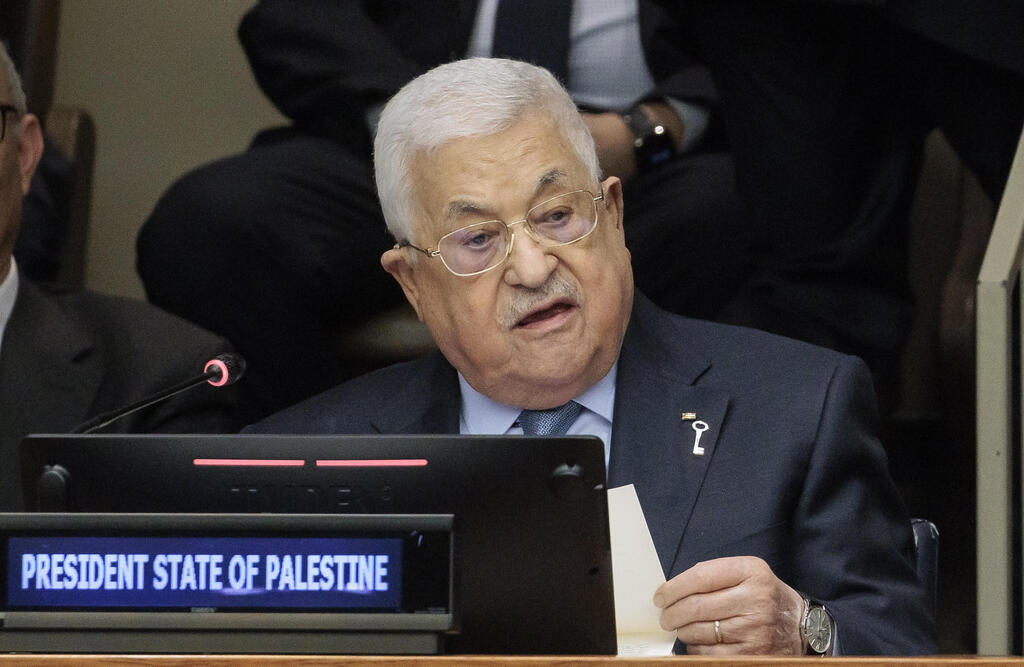New York Times columnist Thomas Friedman, who is considered close to U.S. President Joe Biden, wrote Wednesday in his weekly column that he spoke with the American president about the possibility of a Saudi-Israeli agreement. The agreement would include concessions to the Palestinians that would preserve the option of a two-state solution in the future.
More stories:
"When I interviewed President Biden in the Oval Office last week,” he wrote, “my column focused on his urging Netanyahu not to ram through the judicial overhaul without even a semblance of national consensus.”
3 View gallery


Saudi Crown Prince Muhammed bin Salman, Prime Minister Benjamin Netanyahu and U.S. President Joe Biden
(Photo: EPA, AP)
However, he points out that "that’s not all that we talked about." Friedman claims that the president is undecided about pushing for a security agreement with Saudi Arabia, which would involve normalizing relations with Israel, but only if Israel agrees to concessions for the Palestinians.
According to him, “if the U.S. forges a security alliance with Saudi Arabia — on the conditions that it normalize relations with Israel and that Israel make meaningful concessions to the Palestinians — Netanyahu’s ruling coalition of Jewish supremacists and religious extremists would have to answer this question: You can annex the West Bank, or you can have peace with Saudi Arabia and the whole Muslim world, but you can’t have both, so which will it be?”
Friedman argues that even if such a proposal is presented to the “extremist Israeli government”, "a lot of things have to be agreed to by a lot of people." His comments come against the backdrop of White House National Security Adviser Jake Sullivan’s trip to Saudi Arabia. “Jake Sullivan is not in Riyadh today for tourism,” he wrote.
According to Friedman, the president has not yet decided whether to proceed with the efforts, but he has given his team the "green light" to explore with Saudi Crown Prince Mohammed bin Salman the perhaps most central question at this time: Will he agree to the deal - and at what cost?
The Saudi demands - and Biden's
The Saudis, on their part, are seeking three main things from Washington within the framework of the security agreement: an assurance that the U.S. will defend Saudi Arabia if it comes under attack, most likely from Iran; a monitored civilian nuclear program by the Americans; and the ability to acquire more advanced American weaponry, such as a ballistic missile defense systems.
According to Friedman, the United States also has several demands from the Saudis. A commitment to end the war in Yemen, an "unprecedentedly large" aid package to Palestinian institutions in the West Bank and "significant limits" on the warming relationship between Saudi Arabia and China.
The New York Times first reported about Biden’s efforts toward a historic agreement last month. The report stated that with an eye on the 2024 elections, Biden and his senior officials have engaged in extensive diplomatic efforts to reach a normalization agreement between Jerusalem and Riyadh. The emerging agreement, essentially being negotiated behind closed doors, will require each side to abandon longstanding positions they have held.
On the table, as per the report aligning with Friedman's column, there is also the possibility that Israel may need to agree to Saudi Arabia's nuclear enrichment, as part of a civilian nuclear project. Riyadh's demand could encounter resistance from senior security officials who might warn that it could lead to a nuclear arms race across the broader Middle East.
In order to reach an agreement with Israel, the Saudis will also have to make significant concessions and abandon their longstanding position that peace with Israel can only come after the establishment of a Palestinian state. Publicly, Saudi officials continue to reiterate that any agreement with Israel must include the creation of a state for the Palestinians, a position the kingdom has held since it introduced the Arab Peace Initiative in 2002.
Just last May, and moments before meeting with U.S. Secretary of State Antony Blinken, the Saudi crown prince stated that "the Palestinian issue was, and still is, the central concern for Arabs and Muslims. It is at the top of the kingdom's foreign policy priorities."
Riyadh is doubtful a deal including significant progress with the Palestinians is feasible with the current Israeli government. The Israeli government will have to keep alive the idea of a two-state solution.
In recent months, several senior Israeli officials have been tasked with the matter, including Strategic Affairs Minister Ron Dermer, a former Israeli ambassador to Washington, and National Security Adviser Tzachi Hanegbi. Both have visited the United States several times in recent months, discussing this issue among other things with senior American officials.
Netanyahu himself does not hide his hopes for an agreement with Riyadh, and in an ABC interview Wednesday, he mentioned the issue. He addressed his relationship with the U.S. president, who has not yet officially invited him to the White House, seven months after the start of his sixth term as prime minister, and said, "Our relations are very strong. I can tell you that we are working on things that I think will change history."
"Specifically, we are trying to curb Iran's aggression but at the same time to promote peace with Saudi Arabia." The Prime Minister claimed that such an agreement, following the Abraham Accords, "will change the world." Netanyahu emphasized, "We are working on it."




